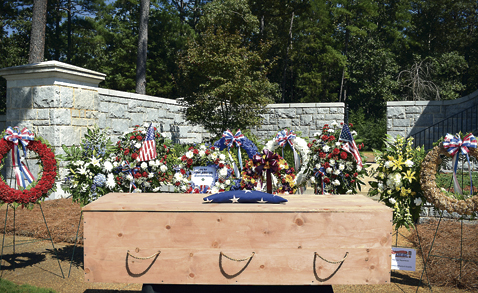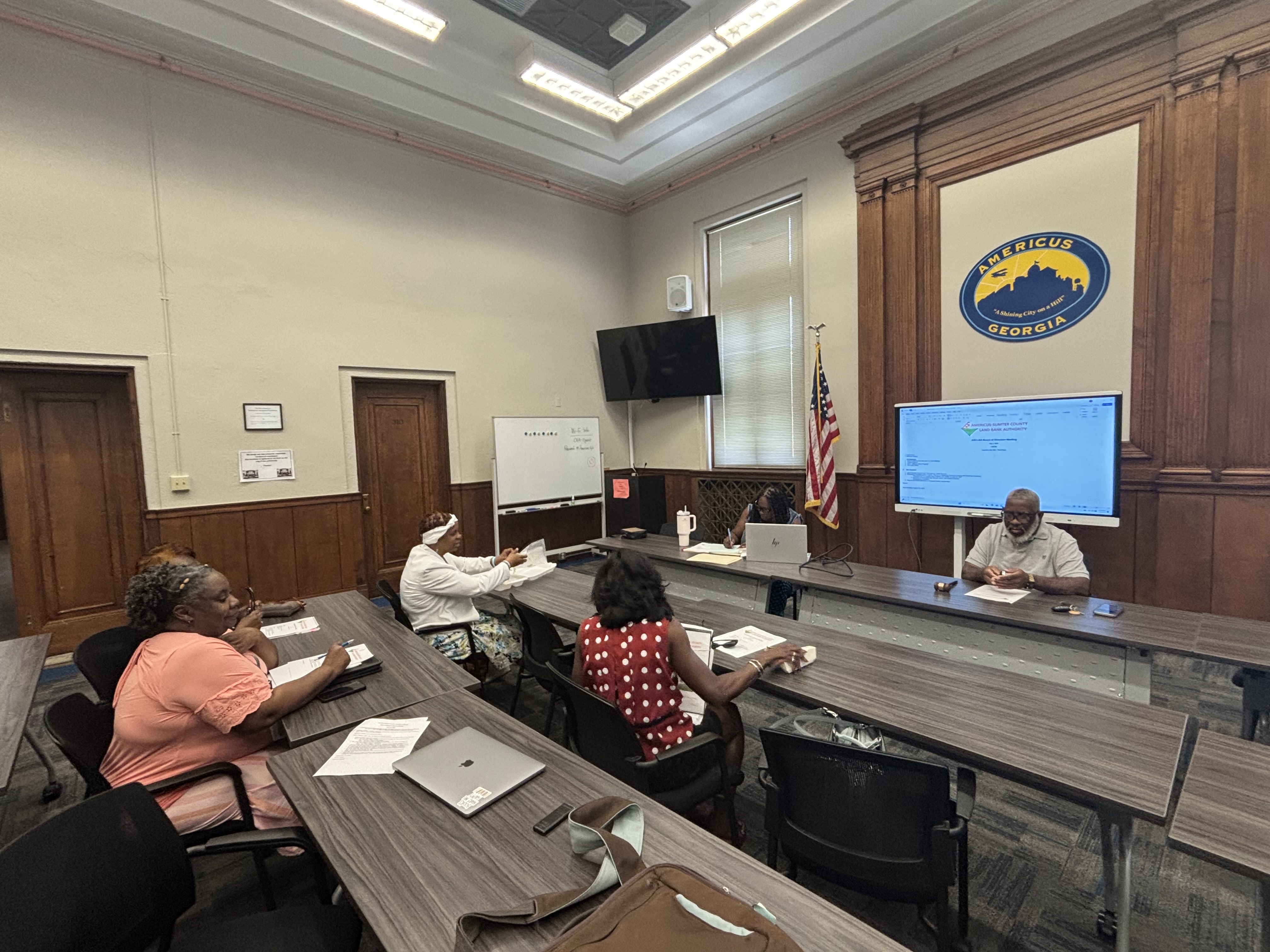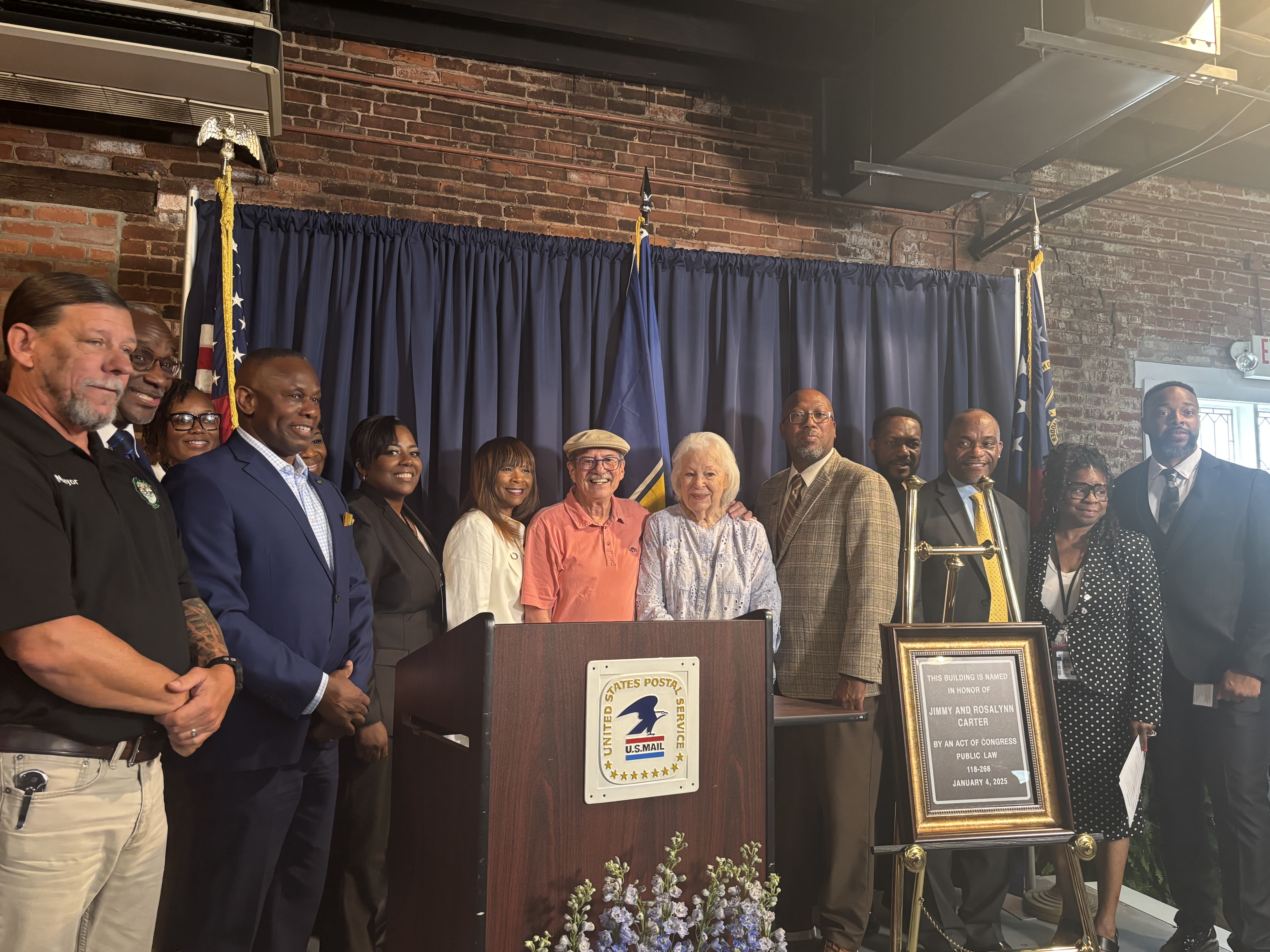Funeral for 13,000 held with dignity
Published 10:25 am Friday, September 25, 2015

- The ceremonial casket was given full military honors.
By BETH ALSTON
beth.alston@americustimesrecorder.com
carpenter-media.go-vip.net.americustimesrecorder.com
ANDERSONVILLE — The Funeral for 13,000, in remembrance of those who died in Camp Sumter during the Civil War, was held with ceremony, solemnity and respect Saturday at Andersonville National Cemetery.
Andersonville National Historic Site Superintendent Charles Sellars was master of ceremonies at the event held under late summer skies with a welcome breeze blowing intermittently.
The flag-draped ceremonial casket was borne on a wagon pulled by a horse and escorted by members of the military and Sumter County Sheriff’s Office. The casket was then taken to the front of the rostrum where it was placed. Ceremonial wreaths were placed there by members of the Army, Navy and Marines, the American Ex-Prisoners of War, as well as civilians.
The Rev. Frederick Buechner of Calvary Episcopal Church in Americus gave the invocation and benediction, and Georgia’s Poet Laureate Judson Mitcham read a poem written for the ceremony.
Lesley Gordon, Ph.D., history professor at Akron (Ohio) University gave a history overview of Camp Sumter.
Keynote speaker, Sgt. Maj. of the Army, Daniel Dailey, was introduced.
Dailey said he was honored to be at Andersonville for the ceremony.
“It’s a great day to be a soldier,” he said. “As a history major, I am very excited to talk about what history teaches us about ourselves. History tends to remember the dates, the battles, the victories. It lauds the winners and favors grand action or monumental failure. But there are some places on the battlefield where dates and battles, winners and losers are matters of inconsequence. In these places, survival is the only thing of magnitude. This place, this ground we walk on today is such a place.
“During a period of 14 months at Camp Sumter … nearly 13,000 or 28 percent of the 45,000 enlisted Union soldiers who were here confined on these grounds died here. Andersonville was a place where survival was against the odds for those who entered the stockades. And those who were blessed to leave were neither not long for this world due to the disease and injury left unchecked here or they were imprisoned further by insurmountable physical or emotional infirmity that lasted into the beyond.
“But this human tragedy, this humanitarian disaster of insufficient food, shelter and medical aid is now infamous in our Civil War narrative. What I will remember today, and what I ask you to remember are the lives lived before Andersonville, the lives lived after Andersonville and the lessons learned as a result of the lives lived and lost because of Andersonville.
“In my attempt to do justice to the 45,000 stories of the prisoners who endured here I will share the story of just one of them,” he said. Dailey related the story of Christian Kephardt, who is “no better and no worse than any other.”
“To those dedicated family members who are here today, please accept my sincere apologies for not having enough time to tell the story of each and every one of them. I wish I could. Just know that you are their voice and our nation appreciates you for keeping their unique chronicles alive. Your contribution to the texture of our country’s rich history of interesting, sad, exciting and complex people is invaluable. Without you, America would be a place defined by numbers on a centuries-old calendar or moldy markers on a map where shells dropped and men were buried. Instead our nation’s history is one of men and women of all backgrounds, both successful in their endeavors and unsuccessful, who came together with their own dreams and built a place for us to endeavor as we may … Sometimes through these stories we gain a glimpse of someone’s life that enriches our own immeasurably. We thank you for helping make our nation great.”
Dailey shared one POW’s story, who was born and bred in Dailey’s home state of Pennsylvania. In 1863, Christian Kephardt, a storekeeper and a father of four daughters, enlisted in the Union Army. He was 31 years old. Dailey said it’s hard to know why a man of Kephardt’s age with a family would decide to enlist, but he did and served in the 13th Calvary Regiment. He said Bill Miller, Kephardt’s great-great-grandfather, also ponders that question. Why did he serve?
“ … Perhaps Kephardt felt a calling to fight against the sins of slavery, perhaps it was because of the enlistment bounty, a sizable amount at the time, would do his family well in this time of need. Perhaps Mr. Miller will never know what prompted his great-great-granddad to join this brotherhood. But I know he will never stop digging until he finally discovers the true answers. And I also know that if not for his persistence we would never have had known this tale of Sgt. Kephardt nor that how his mere existence on this earth created a family of future American soldiers. Being a veteran of Vietnam himself, Bill Miller’s intrigue was piqued by his father’s research on their family Civil War connection.”
Dailey said Miller did further research in the National Archives, studying documentation that “would help paint the portrait of his ancestor as a puzzle, piece after piece, perfectly placed these facts and figures, lists and rosters helped contribute to our now intimate personal glimpse into a shared national history that comes directly from the genealogy of many family trees.”
Dailey said that Miller was also a volunteer soldier, choosing to serve in Vietnam despite being a student at Penn State. Through Miller’s research he learned the improbability of his existence today.
“Little did Kephardt, the great-great-grandson of German immigrants know, that in the course of just one year, he’d enlist, fight, be captured at St. Mary’s Church in Virginia, survive the most infamous prison of his time, be briefly relocated to side-step the feared liberation of Andersonville by Sherman’s troops and die of dysentery months later in a South Carolina prisoner of war camp. Little did he know that his wife would succumb to the pressures of providing and caring for their four girls and make the unimaginable choice to place them in an orphanage for veterans. Little did he know that despite all that was stacked against their successes, these four girls would marry, bear children and contribute to the American story in their own unique ways. One of those unlikely children, born to one of those girls, would be the grandparent of (Bill Miller). He and his two brothers also served our nation.
“This a story of family, of resilience, of selfless service and of sacrifice in the face of insurmountable obstacles. Sgt. Christian Kephardt’s is the story of America. His chronicle is just one of 45,000 stories of men who endured this place of epic tragedy. It’s the story of the lives that carried on afterwards. It’s also the story of the 13,000 souls that never left this place. The battles they fought in, the dates entered in their letters and the diaries of the generals who lead them are of no magnitude in this hallowed ground of Andersonville. Instead, of consequence, is why they did what they did, why they chose to serve in a time of war.
“Today there are approximately one million Americans in the U.S. Army. Yet only about one percent of our entire population of this great nation will ever choose to serve. These men of Andersonville were a special breed. They were men who knew full well the consequences of their actions, and for their own personal reasons, did what few others could or would do. They served. It is this brotherhood I am so honored to represent here today, a brotherhood that bonds us all across the centuries in life, and death. It bonds us in history. We who serve today are following in the footsteps of the men who endured here at Andersonville. Through 14 years of war, on two fronts today, still, we take their example and use it as our inspiration to fight on no matter the circumstances. The red, white and blue banner of the United States of America and the black and white flag that honors our POWs and MIAs fly strong here today, side by side, as we commemorate a place and a war that changed our nation forever. These flags mark progress and change in honor of the men of Andersonville, and for the men and women in the audience today who have suffered the unimaginable hardships of being a prisoner of war in a foreign land. The POW experience these soldiers suffered here at Andersonville, in Vietnam, in Korea, Cambodia and in so many other places, teaches the imprisoned much about themselves. It teaches the Army much about our enemy and teaches the world much about our values. What we have undoubtedly learned from the disaster in Andersonville is that the humane treatment of POWs defines our national identity and reiterates our Army values by ensuring dignity and respect is paid to every enemy combatant. We’ve also learned how precious freedom is and that freedom always, always has a cost. The cost is paid by men and women … who are willing to endure torture, malnutrition, loneliness, despair and even death in the pursuit of freedom’s cause.
“History tends to remember the dates. It remembers the battles and the victories. It lauds the winners and favors grand action or monumental failure. But there are some places on the battlefield where dates and battles, winners and losers, are matters of inconsequence. In these places, survival is the only thing of magnitude. The men of Andersonville have survived. They survived the 150 years of an indelible part of what makes our nation great — the American people.
“… my hope is for the 13,000 souls lost here to rest in peace in the knowledge that their service and sacrifice won a prosperous world and an ever-evolving nation. And that their legacy lives on in the heartbeats of their descendants and the democratic spirit they inspire in those who continue to follow in their footsteps. Although tragic, their sacrifice and service paved the way for us to become this great nation, the greatest nation the world has ever known, the United States of America.
“It is a great day to be a soldier. And I am honored and privileged that these enlisted men gave me that opportunity. God bless them. God bless their families. God bless their legacy. God bless our POWs and MIAs, past and present. God bless this great state of Georgia and God bless the United States of America.”
Military honors were then conducted for the 13,000 as the audience was asked to stand. There was a 21-gun salute and the playing of Taps. The American flag was removed from the casket and ceremoniously folded.
At the conclusion, retired Brig. Gen. Rhonda Cornum, a former POW, raised the American flag from half-staff to full.







